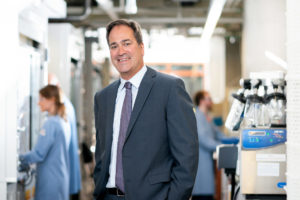
Northwestern investigators have identified a novel approach to control the hierarchical assembly of protein pathways with DNA, according to a study published the Proceedings of the National Academy of Sciences (PNAS).
The approach may facilitate the construction of synthetic protein materials, which can be used for a variety of medical and scientific purposes.
“Hierarchical assembly methods are transformative because the structure of the final material is dictated by the information programmed into each individual building block,” said Chad Mirkin, PhD, professor of Medicine in the Division of Hematology and Oncology, the George B. Rathmann Professor of Chemistry at Northwestern’s Weinberg College of Arts and Sciences, and lead author of the study.
Hierarchical assembly pathways are integral to the structure and function of materials and systems in the body. The building blocks of these pathways are proteins, which are chemically programmed to undergo a sequence of assembly steps to organize and create functional structures, such as muscle tissue or collagen.
However, replicating this process through synthetically programming the assembly of proteins is no small feat, according to Mirkin.
“It is incredibly difficult for humans to synthetically program protein assembly because protein surfaces are chemically complex, and proteins engage in multiple, weak interactions that are often hard to predict,” said Mirkin, who is also director of the International Institute for Nanotechnology and a member of the Robert H. Lurie Comprehensive Cancer Center of Northwestern University.
In the current study, Mirkin’s team repurposed synthetically engineered DNA to direct the hierarchical assembly of proteins and organize different types of protein-based structures. Using DNA sequence design, the investigators used specific chemical reactions to synthetically attach different DNA ligands onto different regions of a model protein’s surface.
“We replaced unpredictable protein-to-protein interactions with predictable and designable DNA-to-DNA interactions to deliberately control the formation of two- and three-dimensional protein materials that cannot be made using other methods or by nature,” Mirkin said.
By defining the specificity, strength and spacing of these interactions, the investigators determined that the choice of DNA sequence could be used to program the order of assembly steps and the overall structural outcomes of each step.
According to Mirkin, protein-DNA materials are promising for myriad medical operations and services, such as tissue engineering, cartilage repair, wound healing and drug delivery, as they can possess properties that exceed those of naturally made materials.
“Hierarchical assembly could circumvent the need to deliver large synthetic materials and instead allow such materials to spontaneously assemble by design and at the point of need,” Mirkin said.
Co-authors of the study include Oliver Hayes, PhD, a former PhD candidate in the Mirkin laboratory, and Benjamin Partridge, PhD, a postdoctoral scholar in the Mirkin laboratory.
This work was supported by the Office of Naval Research grant N00014-15-1-0043 and the Air Force Office of Scientific Research award FA9550-16-1-0150.






